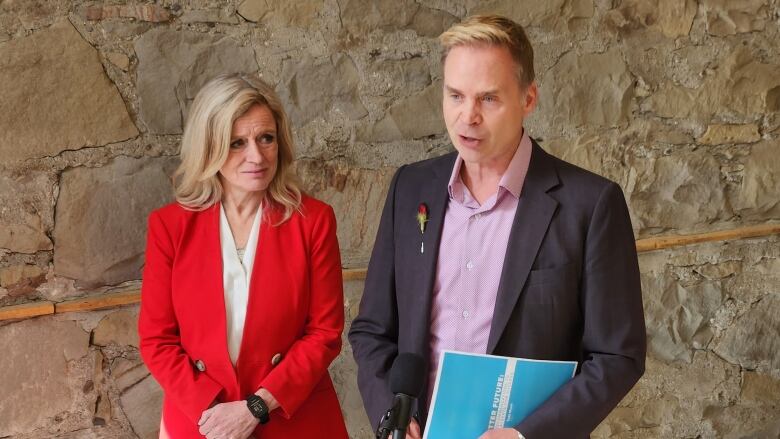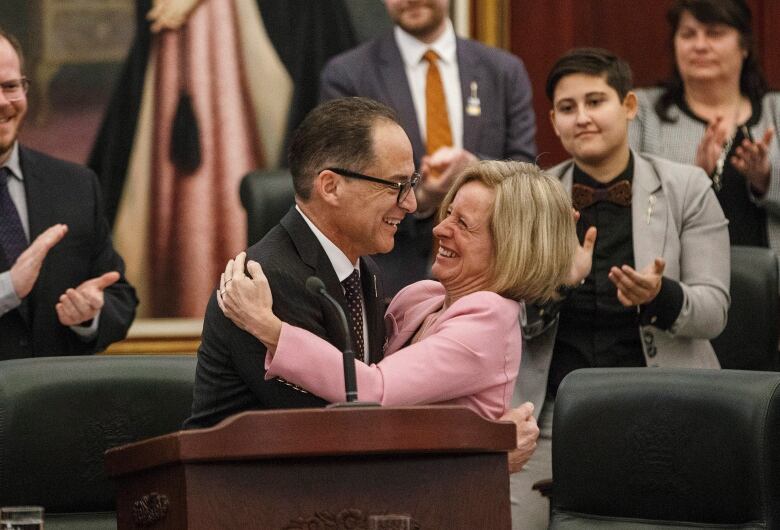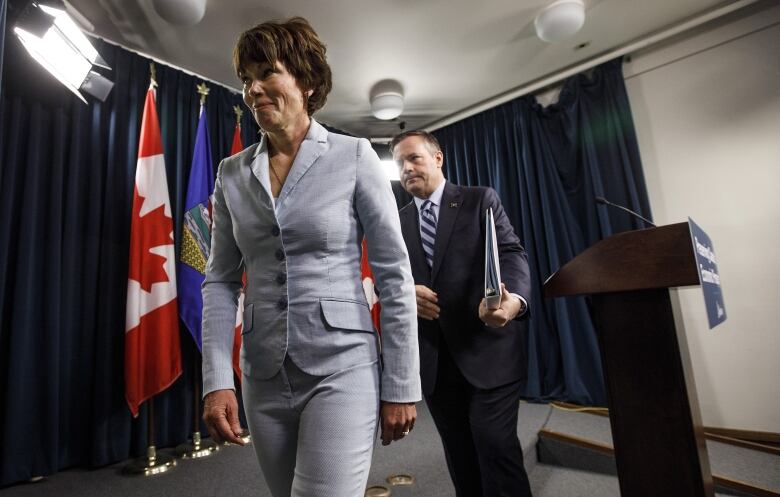Rachel Notley defends against attacks the NDP is bad with money
On economist Todd Hirsch's advice, party would cap amount of oil royalties it spends

Rachel Notley's NDP will not win May's election on the strength of their new fiscal policy. And that's not intended as a knock on the plan, a wholly adopted suite of recommendations by Todd Hirsch, former chief economist for ATB Financial.
There's an accepted wisdom in modern politics: there are sword issues and there are shield issues. Sword issues are the ones a party knows will be core strengths, that they'll make central to their campaign health care and education for the NDP, economic growth and standing up to Ottawa for the United Conservatives.
But neither political side will want to leave themselves vulnerable to attacks on their weak flanks. It's why Premier Danielle Smith acted Friday like an environmental monitor on Twitter, posting good-news water sample findings to social media in the wake of the Kearl oilsands waste spill.
It's also part of the premier's motivation for putting in so much effort to improve hospital wait times and reinvesting far more in the system than Jason Kenney's budgets did.
Health care is a perennial top issue on voters' minds, and a weak one for conservatives, so it makes sense for Smith to do what she can to narrow the NDP's window to lambaste the UCP for health-care chaos.
In 2019, Andrew Scheer's federal Conservatives issued an environmental platform to respond to criticism that his stance against a carbon tax amounted to denialism.
"Anyone who was once an undergraduate humanities major cannot help but notice the feats of margin-stretching and creative font selection that have produced a 61-page document from a guy who was really hoping climate change wouldn't be on the exam," columnist Paul Wells observed at the time. "Scheer just wanted a pamphlet he could wave around and say, 'I've got a Real Plan.'"
Staunching the red ink
The 21 pages Hirsch produced for Notley's team has similar aims. The party knows full well the perception out there that they are big spenders and shoddy financial managers, one that's evergreen for all New Democrat factions in Canada.
Alberta New Democrats also have a sore-spot record of four deficit-laden budgets during their time in government, while Smith's UCP has a surplus budget to run on this spring.
There is, of course, a fundamental reason for that disparity: oil and gas revenues totalled $16.2 billion over the four years of NDP budgets, compared to $45.9 billion forecast between the current fiscal year and the 2023-2024 fiscal year that begins in April. That's the gusher that let Smith sprinkle around affordability payments and juke investment in social services and produce tidy surpluses, to the great envy of past NDP budget-makers.

The clearest idea from Hirsh's blueprint addresses this bonanza factor, and bids to instill some fiscal discipline into a future NDP government. The economist proposed capping the amount of non-renewable resource revenue that could be used for the province's base budget, and using the rest for savings, debt repayment or other to-be-determined surplus purposes.
It's a modification of the strategy former premier Peter Lougheed crafted in the 1970s, when he created the Heritage Savings Trust Fund and pledged 30 per cent of provincial resource royalties would be stashed in it. That formula got halved then eliminated a decade later when oil prices crashed and 30 per cent of "not much" was money the province needed to pay its bills.
Instead, the Hirsch strategy the NDP has adopted would see a predetermined dollar amount say, the first $10 billion of oil and gas revenues go into the spending budget, with the rest treated as surplus.
I'm using a hypothetical amount because neither Hirsch nor Notley want to prescribe yet how much resource revenue is enough for budget purposes, assigning the task of determining that to a future NDP finance minister.
There's simple vagaries and guidelines in the fiscal plan released Friday. More in the Heritage Fund? Let's determine our goals! Debt repayment? Sure, but we can do other things too! Formula for using surplus? We'll have options!
This stands to limit this plan's effectiveness against the UCP attacks to come. But there is a plan! A plan, see?
The human shield
One of the most politically valuable elements of the report for the NDP was the name on its cover.
Hirsch, who retired last year from ATB, is likely the most prominent Alberta economist outside academia, and his advice is designed to lend credibility to a party that craves some on economic and fiscal matters. (He's not running as an NDP candidate or serving on their election campaign, but expect Notley to repeatedly invoke his name on the hustings, with his benediction.)
Associations like this matter, at least notionally. The Notley government brought in former Bank of Canada governor David Dodge to advise them on the merits of deficit-time infrastructure spending, but it's hard to gauge how much political benefit that on-the-defensive appointment had.
But Hirsch is a better-known name in Calgary boardrooms, the place from which votes and donations alike can flow.
And won't the United Conservatives be feeling wistful on that score this weekend.

On Friday, senior cabinet ministers Travis Toews and Sonya Savage both announced they won't be running for Smith's party, with two months left before the election.
Savage represented Calgary North-West, an oil sector veteran who was Kenney's energy minister and Smith's environment minister. Toews served both premiers as finance minister, a job that roots one heavily in corporate Calgary.
Both politicians entered politics on Kenney's coattails, and Savage had endorsed Toews' unsuccessful leadership campaign against Smith. Their departures shear the number of prominent figures left in the moderate, pre-Smith party establishment.
Along with the likes of fellow Calgary MLAs Tyler Shandro, Jason Copping and the already-quit Doug Schweitzer, they represented an internal bulwark of sorts against the rurally-rooted populism that propelled Smith into the UCP leadership.
Many Calgary UCPers who were active in the Progressive Conservative government days and fought to support Kenney over the NDP are likely sighing over what this means for the party's present and future. There will also be anxiety about what message it sends to Calgary's moderate and centrist swing voters.
Smith has announced she will appoint candidates in both ridings. There's a shield-issue factor there, as critics will watch for any signs of controversial or woollier figures the premier adds to her roster.
The UCP may want their own safe, broadly appealing Hirsch-like candidates instead. It would let them spend more energy trying to pierce the NDP's nascent armour on the financial files, and less time with the shields up.












_(720p).jpg)


 OFFICIAL HD MUSIC VIDEO.jpg)
.jpg)



























































































